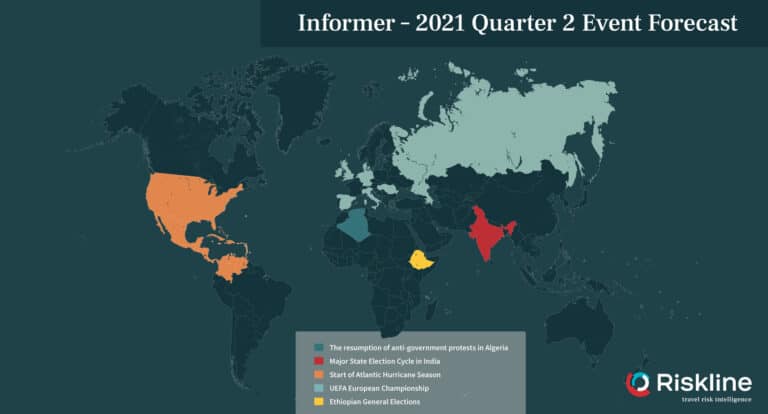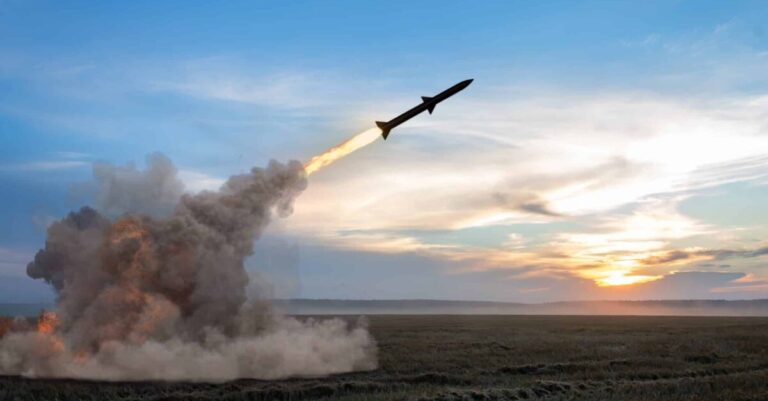Let’s review the 2021 Q2 Forecast by Riskline
The Resumption of Anti-Government Protests in Algeria
On 22 February, thousands of people rallied in Algiers and other cities to mark the two-year anniversary of the protest movement, known locally as the ‘Hirak’, to reiterate their demands for a complete overhaul of the political system in a country where the military has dominated politics since independence from France in 1962. The peaceful protests led to the resignation of then-President Abdelaziz Bouteflika in April 2019, but were suspended in March 2020 due to the COVID-19 pandemic.
The current government of President Abdelmadjid Tebboune, who was elected in December 2019, lacks a clear strategy to overcome the political and economic challenges facing Algeria, and has instead implemented a series of political reforms and attempted to appease the Hirak, while simultaneously cracking down on media outlets and dissent. Protests have continued on a weekly basis since 22 February and are likely to persist and escalate in the next few months despite the COVID-19 pandemic, as the positions of the Hirak and the government appear to be fundamentally different.
Major State Election Cycle India
Tightly-contested Legislative Assembly elections, which started on 27 March, will take place through April across Assam, Kerala, Tamil Nadu and West Bengal states as well as the union territory of Puducherry in India. In Assam, the centre-ruling Bharatiya Janata Party (BJP) will face a strong challenge from the regional Asom Gana Parishad party and the Congress-AIUDF alliance. One of the toughest election battles is expected in West Bengal where the BJP has made unprecedented headway as the opposition against the regional Trinamool Congress party which has ruled undeterred since 2011.
Tensions have always remained high between rival parties during election season and are likely to be exacerbated this year due to the high stakes involved. Statewide disruptions to travel and services are expected, including heightened security measures near polling stations, party offices, government buildings, transportation hubs and any electoral infrastructure. Campaign rallies frequently block roads and disrupt traffic; violent clashes between rival party members are also very common in both urban and rural areas. Public and private transportation remains limited during election days.
Start of Atlantic Hurricane Season
The Atlantic hurricane season officially begins on 1 June, but due to climate change, it will begin earlier every year and more intense storms will occur with greater frequency. The severity of these weather events will impact the United States (US), Caribbean nations and Central America most. Urbanised coastal areas built for once-in-a-century weather events will increasingly be hammered by severe weather every few years, necessitating major infrastructure investments to reduce their impact.
While the costs of weatherising affected communities will be high, economic losses generated by dangerous storms have the potential to run much higher. Politically, the impact of major hurricanes in the hemisphere will drive displacement in less developed nations, causing economic and social instability. Displacement drives increased migration to the US, an issue that has become a third rail in domestic politics. Due to this, the US government has identified stemming the root causes of migration in Central America, including the amelioration of climate change, as a key policy priority.
UEFA European Championship
Starting on 11 June and finishing on 11 July, and to be held across 11 countries, this will be the first major international sporting tournament with spectators since the start of the pandemic. Crowds at matches will be capped, and there will be COVID-19 safety precautions for fans attending, such as mandatory facemasks and temperature checks. However, both sanctioned and unsanctioned gatherings of fans away from stadiums may cause COVID-19 outbreaks. In the last year, restrictions on mass gatherings have not stopped fans gathering during important matches.
Aside from COVID-19, there are other risks related to the tournament. In recent years, several football matches in Europe have been targeted by terrorists, such as the France vs Germany match during the Paris Attacks of 2015. There may also be fan-related disorder in city centres on days when a nation’s team is playing. During the 2016 edition of the tournament in France, several French cities were marred by fan violence. For example, Trafalgar Square in London should be avoided on days that England are playing, particularly on 17 June when they play Scotland.
Ethopian General Elections
Ethiopia’s elections were postponed from their initial date of 29 August 2020, due to COVID-19. However, the postponement then contributed heavily to a rift between Addis Ababa and the Tigray People’s Liberation Front (TPLF), which in turn sparked into the ongoing conflict in the Tigray region. In late December 2020, the National Election Board of Ethiopia (NEBE) announced that general elections would be held on 5 June 2021, across all regions except Tigray, before the situation in other areas such as Amhara, deteriorates further.
Some 47 parties registered candidates for the 547-seat federal parliament and regional councils, with a record 125 independent candidates. However, concerns have been voiced by candidates nationwide that the security situation across many states will compromise voter registration and campaign outreach. Incumbent Prime Minister Abiy Ahmed’s Prosperity Party will be challenged by a coalition of opposition parties made up of Oromo Federalist Congress (OFC), Oromo Liberation Front (OLF) and Oromo Nationalist Party (ONP), who are expected to present a solid challenge to PM Ahmed and the ruling Prosperity Party.

